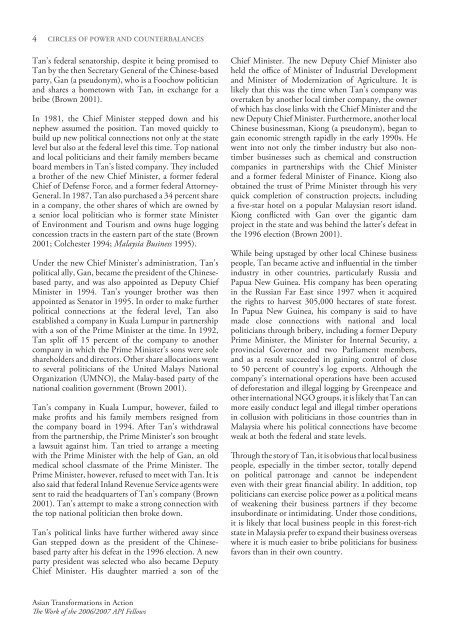Asian Transformations in Action - Api-fellowships.org
Asian Transformations in Action - Api-fellowships.org
Asian Transformations in Action - Api-fellowships.org
You also want an ePaper? Increase the reach of your titles
YUMPU automatically turns print PDFs into web optimized ePapers that Google loves.
4CIRCLES OF POWER AND COUNTERBALANCESTan’s federal senatorship, despite it be<strong>in</strong>g promised toTan by the then Secretary General of the Ch<strong>in</strong>ese-basedparty, Gan (a pseudonym), who is a Foochow politicianand shares a hometown with Tan, <strong>in</strong> exchange for abribe (Brown 2001).In 1981, the Chief M<strong>in</strong>ister stepped down and hisnephew assumed the position. Tan moved quickly tobuild up new political connections not only at the statelevel but also at the federal level this time. Top nationaland local politicians and their family members becameboard members <strong>in</strong> Tan’s listed company. They <strong>in</strong>cludeda brother of the new Chief M<strong>in</strong>ister, a former federalChief of Defense Force, and a former federal Attorney-General. In 1987, Tan also purchased a 34 percent share<strong>in</strong> a company, the other shares of which are owned bya senior local politician who is former state M<strong>in</strong>isterof Environment and Tourism and owns huge logg<strong>in</strong>gconcession tracts <strong>in</strong> the eastern part of the state (Brown2001; Colchester 1994; Malaysia Bus<strong>in</strong>ess 1995).Under the new Chief M<strong>in</strong>ister’s adm<strong>in</strong>istration, Tan’spolitical ally, Gan, became the president of the Ch<strong>in</strong>esebasedparty, and was also appo<strong>in</strong>ted as Deputy ChiefM<strong>in</strong>ister <strong>in</strong> 1994. Tan’s younger brother was thenappo<strong>in</strong>ted as Senator <strong>in</strong> 1995. In order to make furtherpolitical connections at the federal level, Tan alsoestablished a company <strong>in</strong> Kuala Lumpur <strong>in</strong> partnershipwith a son of the Prime M<strong>in</strong>ister at the time. In 1992,Tan split off 15 percent of the company to anothercompany <strong>in</strong> which the Prime M<strong>in</strong>ister’s sons were soleshareholders and directors. Other share allocations wentto several politicians of the United Malays NationalOrganization (UMNO), the Malay-based party of thenational coalition government (Brown 2001).Tan’s company <strong>in</strong> Kuala Lumpur, however, failed tomake profits and his family members resigned fromthe company board <strong>in</strong> 1994. After Tan’s withdrawalfrom the partnership, the Prime M<strong>in</strong>ister’s son broughta lawsuit aga<strong>in</strong>st him. Tan tried to arrange a meet<strong>in</strong>gwith the Prime M<strong>in</strong>ister with the help of Gan, an oldmedical school classmate of the Prime M<strong>in</strong>ister. ThePrime M<strong>in</strong>ister, however, refused to meet with Tan. It isalso said that federal Inland Revenue Service agents weresent to raid the headquarters of Tan’s company (Brown2001). Tan’s attempt to make a strong connection withthe top national politician then broke down.Tan’s political l<strong>in</strong>ks have further withered away s<strong>in</strong>ceGan stepped down as the president of the Ch<strong>in</strong>esebasedparty after his defeat <strong>in</strong> the 1996 election. A newparty president was selected who also became DeputyChief M<strong>in</strong>ister. His daughter married a son of theChief M<strong>in</strong>ister. The new Deputy Chief M<strong>in</strong>ister alsoheld the office of M<strong>in</strong>ister of Industrial Developmentand M<strong>in</strong>ister of Modernization of Agriculture. It islikely that this was the time when Tan’s company wasovertaken by another local timber company, the ownerof which has close l<strong>in</strong>ks with the Chief M<strong>in</strong>ister and thenew Deputy Chief M<strong>in</strong>ister. Furthermore, another localCh<strong>in</strong>ese bus<strong>in</strong>essman, Kiong (a pseudonym), began toga<strong>in</strong> economic strength rapidly <strong>in</strong> the early 1990s. Hewent <strong>in</strong>to not only the timber <strong>in</strong>dustry but also nontimberbus<strong>in</strong>esses such as chemical and constructioncompanies <strong>in</strong> partnerships with the Chief M<strong>in</strong>isterand a former federal M<strong>in</strong>ister of F<strong>in</strong>ance. Kiong alsoobta<strong>in</strong>ed the trust of Prime M<strong>in</strong>ister through his veryquick completion of construction projects, <strong>in</strong>clud<strong>in</strong>ga five-star hotel on a popular Malaysian resort island.Kiong conflicted with Gan over the gigantic damproject <strong>in</strong> the state and was beh<strong>in</strong>d the latter’s defeat <strong>in</strong>the 1996 election (Brown 2001).While be<strong>in</strong>g upstaged by other local Ch<strong>in</strong>ese bus<strong>in</strong>esspeople, Tan became active and <strong>in</strong>fluential <strong>in</strong> the timber<strong>in</strong>dustry <strong>in</strong> other countries, particularly Russia andPapua New Gu<strong>in</strong>ea. His company has been operat<strong>in</strong>g<strong>in</strong> the Russian Far East s<strong>in</strong>ce 1997 when it acquiredthe rights to harvest 305,000 hectares of state forest.In Papua New Gu<strong>in</strong>ea, his company is said to havemade close connections with national and localpoliticians through bribery, <strong>in</strong>clud<strong>in</strong>g a former DeputyPrime M<strong>in</strong>ister, the M<strong>in</strong>ister for Internal Security, aprov<strong>in</strong>cial Governor and two Parliament members,and as a result succeeded <strong>in</strong> ga<strong>in</strong><strong>in</strong>g control of closeto 50 percent of country’s log exports. Although thecompany’s <strong>in</strong>ternational operations have been accusedof deforestation and illegal logg<strong>in</strong>g by Greenpeace andother <strong>in</strong>ternational NGO groups, it is likely that Tan canmore easily conduct legal and illegal timber operations<strong>in</strong> collusion with politicians <strong>in</strong> those countries than <strong>in</strong>Malaysia where his political connections have becomeweak at both the federal and state levels.Through the story of Tan, it is obvious that local bus<strong>in</strong>esspeople, especially <strong>in</strong> the timber sector, totally dependon political patronage and cannot be <strong>in</strong>dependenteven with their great f<strong>in</strong>ancial ability. In addition, toppoliticians can exercise police power as a political meansof weaken<strong>in</strong>g their bus<strong>in</strong>ess partners if they become<strong>in</strong>subord<strong>in</strong>ate or <strong>in</strong>timidat<strong>in</strong>g. Under those conditions,it is likely that local bus<strong>in</strong>ess people <strong>in</strong> this forest-richstate <strong>in</strong> Malaysia prefer to expand their bus<strong>in</strong>ess overseaswhere it is much easier to bribe politicians for bus<strong>in</strong>essfavors than <strong>in</strong> their own country.<strong>Asian</strong> <strong>Transformations</strong> <strong>in</strong> <strong>Action</strong>The Work of the 2006/2007 API Fellows
















